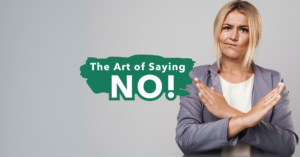We all know people who over-apologize. Individuals who take responsibility for everything – even things they didn’t do. Research tells us that women tend to over-apologize more than men. As comedian and writer Amy Poehler puts it, “It takes years as a woman to unlearn what you have been taught to be sorry for.”
Harriet Lerner, Ph.D. wrote about why people over-apologize in a Psychology Today article.
“It may be a reflection of low self-esteem, a diminished sense of entitlement, an unconscious wish to avoid any possibility of criticism or disapproval before it even occurs, an excessive wish to placate and please, some underlying river of shame, or a desire to show off what a well-mannered Brownie Scout one is.
Or, alternatively, the reflexive “I’m sorrys” may be nothing more than a verbal tic, a little self-effacing girl-thing that developed long ago, and now is something like an automatic hiccup.”
Whether it’s an occasional hiccup, or a deeply engrained habit, it’s time to embrace your self-confidence and save the apology for when it’s appropriate.
Apology by Default
Begin by auditing your over-apologizing, so you can recognize it and be mindful about how you can self-edit moving forward. This list of over-apology traps comes from Kali Coleman at BestLife
- You apologize for things you have no control over.
- You apologize for someone else’s actions.
- You apologize for normal occurrences like a sneeze.
- You apologize before you ask for something.
- You repeat your apology repeatedly.
- You apologize when you are trying to be assertive.
Sorry, Not Sorry
The minimizing language of over-apologizing can hurt your career. The Harvard Business Review podcast Women at Work discusses what to say instead.
In the era of ChatGPT and plug-ins for email, you can use technology to be reminded of how to edit out the “I’m sorry…”, “I’m just…”, “I’m no expert, but…” and other minimizing language before you hit send.
It’s about striking a balance and choosing language that showcases your self-confidence and knowing when to apologize. The gratuitous apology does not signal strength, confidence, or being fully present and minimizes your contribution. It sets the tone for how others perceive you.
If you want to be seen as a leader, someone who is trusted and someone of authority – the habitual apology diminishes your efficacy.
Break the Habit
It takes self-awareness and discipline to get out in front of over-apologizing and using language that hedges your assertive and confident communication.
Reprogramming your communication is not as daunting as it may seem. Positioning yourself as someone with confidence starts with what you should be saying.
Sally Helgesen, cited as a premier expert on women’s leadership by Forbes has a new book, Rising Together: How We can Bridge Divides and Create a More Inclusive Workplace. She shared a familiar scenario on the Women at Work podcast with a reframed response for an apology.
Situation: A woman leader arrives a minute or two late to a meeting. Flustered, she begins by apologizing for her tardiness even though the meeting has not yet begun, and she was not the only one who arrived slightly late. Her apology sets the tone for how others react and listen to her (or not) during the meeting – she is starting from a diminished capacity that she initiated with the apology.
Reframe: Instead of starting with an apology, Helgesen coaches women to begin with positive, confident, and affirming language that sets a tone of trust as follows:
- “I’m so glad to be here…”
- “Thank you for waiting for me…” – no need to add why you were late.
- “I’m really looking forward to what we are discussing today…”
These are gracious acknowledgements and set the tone for trust, engagement, and confidence.
Leading with Confident Language
A shout-out to Kris Taylor of Evergreen Leadership – a friend and colleague who artfully coaches leaders how to communicate with present and affirming language that exudes confidence.
Kris breaks down better language for better results:
Critical and Forceful – leads to self-doubt and diminishing confidence.
- I never…
- I need to be more…
- I should be more…
- Why can’t I?…
Not in the Present – lacks clarity of intention and follow-through.
- I have to…
- I need to…
- I am going to…
- I wish I would have…
Present and Affirming – instills confidence and power.
- I am…
- I choose…
- I will…
- How might I …
- I wonder…
By starting your communication with affirming language, you begin from a position of power, command, presence, and confidence that embodies a leader with influence.
The Verbal Do-Over
Melody Wilding, LMSW writes about the verbal do-over in Forbes as a way to replace unwarranted apologies with accurate statements.
“I often tell clients I work with that there’s no shame in asking for verbal do-overs, particularly with family and friends. For example, if you need to cancel happy hour plans with a friend and find yourself auto-apologizing out of habit, catch yourself and say, “You know, what I really wanted to say is…thanks for understanding. It’s a crazy week with all these upcoming deadlines and I appreciate you being flexible.” Done. Now doesn’t that feel better than spewing out “sorry, sorry I’m the worst, I know“?”
Find a coach, or an accountability partner that can help you identify your over-apologizing triggers. It begins with self-awareness and takes practice to combat this habit. Give yourself permission to tap the do-over in safe spaces until you master the apology edit. It’s refreshing to hear someone lead with language that exudes confidence. There are certainly times when an apology is appropriate, but the overuse dilutes the sincerity of a true apology.
Caroline Dowd-Higgins is passionate about unlocking the art-of-the-possible in her work with individuals and organizations as an executive coach, consultant, and speaker. Her new book, “Your Career Advantage: Overcome Challenges to Achieve a Rewarding Work Life” is empowering people to enjoy their careers and love their lives. Caroline hosts the award winning podcast, Your Working Life available on major podcast platforms with listeners in 16 countries. Her celebrated TEDxWOMEN talk about reframing failure is available on YouTube. Follow her on Facebook, LinkedIn, and Twitter.





